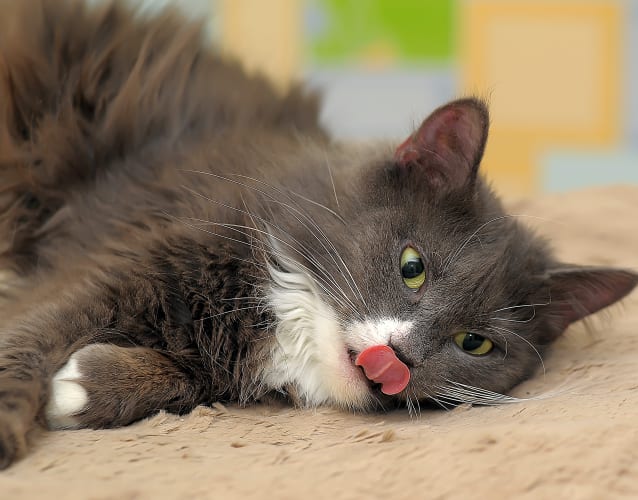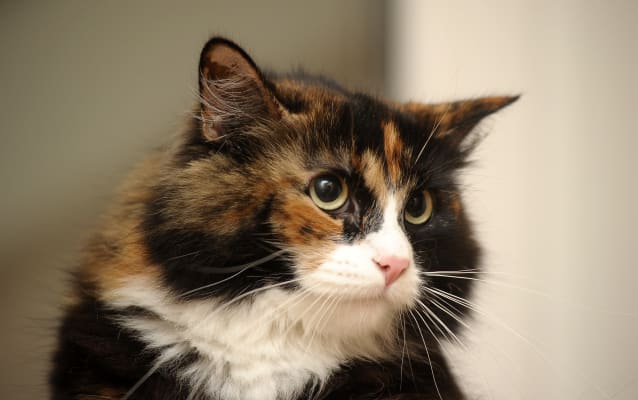I-131 Radioactive Iodine Therapy for Hyperthyroidism
Memphis Veterinary Specialists & Emergency offers Radioactive Iodine Therapy for cats diagnosed with hyperthyroidism.
Treatment Provided by Dr. Laura Bahorich
Dr. Laura Bahorich, VMD, is a veterinarian at Memphis Veterinary Specialists & Emergency in Cordova trained in the treatment of hyperthyroidism in cats using I-131 Radioactive Iodine therapy.
What is Hyperthyroidism?
Hyperthyroidism is a very common endocrine disease of older cats. It causes an increased metabolic rate, which in turn causes a variety of signs including weight loss, vomiting, diarrhea, rapid or irregular heart rate, increased blood pressure or other problems.
What is I-131 Therapy?
Radioiodine (I-131) therapy has been used extensively in veterinary medicine and has a success rate approaching 95-98% for hyperthyroid cats with only one treatment. The radioactive iodine is absorbed into the abnormal thyroid tissue, leaving nearby normal thyroid tissue and other organs undamaged. Your cat’s normal thyroid tissue will resume functioning after the benign tumor is gone, usually within a month of therapy.


FAQs About I-131 Therapy for Hyperthyroid Cats
- What are the treatment options for hyperthyroidism?
The three primary options for treatment of hyperthyroidism include surgical removal of the affected thyroid gland, medical therapy with Tapazole (methimazole), or radioiodine therapy.
Complications associated with surgery include anesthetic risks and damage to the parathyroid gland primarily, as well as risk of recurrence.
Tapazole therapy can cause vomiting, skin rash, as well as liver and bone marrow problems.
In addition to daily pilling, close monitoring of blood work is essential with Tapazole therapy, and can incur annual costs.
In rare cases (<5%), some cats may require a second treatment or develop hypothyroidism (under-active thyroid gland) that requires daily thyroid hormone supplementation.
- Why does my cat have to remain hospitalized for so long after treatment?
Because the radioactive material remains in the cat’s body and is excreted primarily through the urine and feces, your cat is required by Tennessee state law to remain in our facility until his/her levels are considered low enough for discharge.
The standard hospital stay is about 5 days, though some cases may require an extended stay. While hospitalized, your cat will be monitored daily by a trained staff member as well as a veterinarian. Medications will be administered as needed, and we encourage you to bring a week’s supply of your cat’s favorite food.
Unfortunately, no personal effects can be returned so we suggest not leaving any cat toys or bedding (we will provide these).
Also, by law, we cannot allow visitation until your cat is ready for discharge, but we will give you daily progress reports on your cat.
- What is required following discharge from the hospital?
For two weeks following discharge, we request you follow some sensible safety measures while any remaining radiation is excreted from your cat’s body.
You will receive detailed written instructions that include limiting extensive contact (especially with children or pregnant women), washing hands after handling your cat or his/her litter box, and disposing of litter box waste. Your cat will also need to remain indoors during that time.
- Will my cat experience radiation sickness?
The treatment is given via a subcutaneous injection, similar to a vaccination. They do not experience radiation sickness. Radioactive iodine is a very safe and effective treatment and is used frequently in human medicine.
- How do I schedule an appointment for I131 for my cat?
Please talk with your veterinarian about your cat’s case and whether he or she is an appropriate candidate for I131. Memphis Veterinary Specialists is a referral-based hospital, which means we work closely with your veterinarian to provide the best possible care for your cat. We prefer a referral from your veterinarian before we see your cat for evaluation or treatment
From Happy Pet Owners
-
Dr. Miller and all of the MVS staff are fantastic! They all have gone above and beyond for our precious Peteie! Thank you for all you do.”
